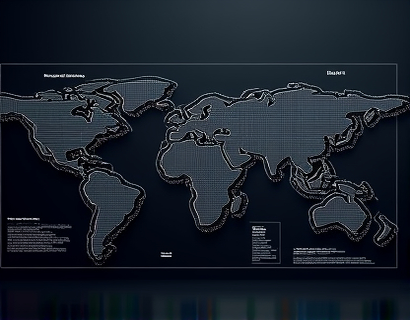Decentralized Corporation Software: Revolutionizing Business Registration
In the rapidly evolving landscape of business operations, the need for innovative solutions that enhance efficiency, security, and compliance has never been more critical. Decentralized corporation software emerges as a transformative force, offering businesses a new paradigm for registration and management. This article delves into the intricacies of decentralized software designed specifically for business registration, highlighting its benefits and the profound impact it can have on corporate management.
The traditional process of business registration is often cumbersome, time-consuming, and fraught with complexities. It involves multiple steps, from initial setup to ongoing compliance with regulatory requirements. These processes can be streamlined significantly with the advent of decentralized technology. By leveraging blockchain and distributed ledger technology, decentralized software provides a secure, transparent, and efficient alternative to conventional methods.
Enhancing Security and Compliance
One of the primary advantages of decentralized corporation software is its ability to enhance security and ensure compliance. Traditional registration systems are often centralized, making them vulnerable to hacking and data breaches. Decentralized systems, on the other hand, distribute data across a network of nodes, reducing the risk of a single point of failure. This distributed approach ensures that sensitive information is more secure and less susceptible to unauthorized access.
Compliance is another critical aspect where decentralized software shines. Regulatory requirements can vary significantly across jurisdictions, and maintaining compliance is a continuous challenge for businesses. Decentralized platforms can be programmed to automatically update and enforce compliance rules, ensuring that businesses stay within legal boundaries without the need for constant manual intervention. Smart contracts, a key feature of blockchain technology, can automate compliance checks and enforce contractual obligations, reducing the risk of errors and non-compliance.
Streamlining the Registration Process
The registration process for businesses is often a bureaucratic nightmare, involving numerous forms, documents, and interactions with various government agencies. Decentralized software simplifies this process by creating a seamless, user-friendly experience. From the initial application to the final approval, every step can be digitized and automated, reducing the time and effort required.
For instance, a decentralized platform can allow entrepreneurs to submit all necessary documentation in a single, secure location. The system can then verify the authenticity of the documents using blockchain technology, ensuring that all requirements are met before proceeding to the next stage. This not only speeds up the process but also minimizes the potential for errors and fraud.
Key Features of Decentralized Registration Software
Decentralized registration software comes with several key features that make it an attractive solution for businesses:
- Decentralized Storage: Data is stored across a network of nodes, enhancing security and reducing the risk of data loss.
- Smart Contracts: Automate compliance checks and enforce contractual obligations, ensuring that all regulatory requirements are met.
- Transparency: All transactions and processes are recorded on a blockchain, providing a transparent and auditable trail.
- Accessibility: Businesses can access and manage their registration information from anywhere in the world, at any time.
- Cost Efficiency: Reduced need for intermediaries and paper-based processes leads to significant cost savings.
Experience the Future of Business Registration
Imagine a world where business registration is as simple as a few clicks on a user-friendly interface, where compliance is guaranteed, and security is unparalleled. This is the future that decentralized corporation software promises. By adopting such technology, businesses can experience a transformative shift in how they operate and manage their registration processes.
For entrepreneurs and business owners seeking decentralized solutions, the benefits are clear. Decentralized registration software not only simplifies the initial setup but also provides ongoing support for compliance and security. This is particularly valuable in a global economy where businesses must navigate a complex web of regulations and standards.
Real-World Applications and Success Stories
Several companies have already embraced decentralized registration software, reaping the rewards of this innovative approach. For example, a fintech startup used a decentralized platform to streamline its incorporation process, reducing the time from several months to just a few days. The transparency and security provided by the blockchain ensured that all regulatory requirements were met, and the company was able to focus on growth rather than administrative tasks.
Another case involves a multinational corporation that implemented a decentralized registration system across its global operations. The platform enabled real-time compliance monitoring and automated reporting, significantly reducing the workload of compliance teams and minimizing the risk of errors. The result was a more agile and responsive organization, better equipped to adapt to changing market conditions.
Challenges and Considerations
While the benefits of decentralized corporation software are substantial, there are also challenges and considerations that businesses should be aware of. One of the primary concerns is the technological barrier. Implementing decentralized solutions requires a certain level of technical expertise, which may not be readily available in all organizations. However, as the technology matures and becomes more user-friendly, this barrier is expected to diminish.
Another consideration is the regulatory landscape. While decentralized technology offers many advantages, it also operates in a relatively uncharted legal territory. Businesses should stay informed about the regulatory environment in their jurisdictions and ensure that their decentralized solutions comply with local laws and regulations.
Future Trends and Innovations
The future of decentralized corporation software is promising, with ongoing innovations set to further enhance its capabilities. One area of focus is the integration of artificial intelligence (AI) and machine learning (ML) to improve the efficiency and accuracy of registration processes. AI can help in automating complex tasks, such as document verification and compliance checks, making the system even more robust and user-friendly.
Another exciting development is the potential for interoperability between different decentralized platforms. As more businesses adopt these solutions, the need for seamless integration and data sharing becomes increasingly important. Standards and protocols that facilitate interoperability will play a crucial role in the widespread adoption of decentralized registration software.
Conclusion
Decentralized corporation software represents a significant leap forward in the way businesses are registered and managed. By leveraging blockchain and distributed ledger technology, these platforms offer enhanced security, compliance, and efficiency, marking a transformative shift in corporate management. As the technology continues to evolve, it is poised to become an essential tool for businesses looking to operate in a secure, transparent, and agile manner. Embracing decentralized solutions is not just an option but a strategic advantage in the modern business landscape.









































